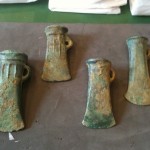 Citizen science has been one of the most appealing success stories of enlisting the crowd to achieve particular tasks. It’s probably fair to say however that most citizen science projects have looked either to the future or the present. There haven’t been many that have looked far into the past.
Citizen science has been one of the most appealing success stories of enlisting the crowd to achieve particular tasks. It’s probably fair to say however that most citizen science projects have looked either to the future or the present. There haven’t been many that have looked far into the past.
That’s the aim of a new citizen science project that has been launched by UCL and the British Museum that is seeking to gain new insights into life in the Bronze Age. The project began by sifting through expertly acquired objects and records from the Bronze Age era. They’re now turning to the crowd to help with the modelling, transcribing and locating of these objects.
The project is hoping to attract enthusiastic amateurs to help catalogue some of the 30,000 or so items contained in the Portable Antiquities Scheme database.
“This information has long been known to be an extremely important untapped resource,” says curator Neil Wilkin, “Metal finds are not only crucial forms of evidence for dating Britain’s prehistoric past, but also tell us a great deal about prehistoric society and economy. Once we have digitised the thousands of objects in this catalogue, they can be incorporated into the Portable Antiquities Scheme (PAS) website. The result will be the largest national database of prehistoric metal finds anywhere in the world and a near-comprehensive view of what we currently know about such finds in the UK. This will allow rethinking of almost everything we currently know about the use of metal in Bronze Age Britain, giving us a far more comprehensive view of our prehistoric past.”
All of the data originating from the project will be made available under an open license, which the project team hope will further improve understanding in this area.
Professor Bevan added: “The UCL Institute of Archaeology is really well-placed to foster a crowd-sourcing project of this kind, because we have such a wealth of expertise under one roof, spanning computer-based methods, artefact studies, public engagement in archaeology, archival science and British prehistory to name just a few.
“One of the things that makes MicroPasts such an exciting project is the fact that we can potentially take it in so many different future directions. We plan to create yet more crowd-sourcing applications for the platform, following both our own personal research interests and those of other university or museum researchers worldwide, but also the ideas of the contributors we attract online.”